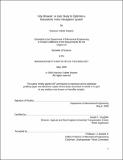City browser : a user study to optimize a naturalistic voice navigation system
Author(s)
Roberts, Shannon Colette
DownloadFull printable version (754.4Kb)
Alternative title
User study to optimize a naturalistic voice navigation system
Other Contributors
Massachusetts Institute of Technology. Dept. of Mechanical Engineering.
Advisor
Joseph F. Coughlin.
Terms of use
Metadata
Show full item recordAbstract
Advanced automotive technology such as adaptive cruise control and navigation systems are becoming ever more popular. With all of the technology to aid the driver, it is difficult to recognize when the technology used to inform the driver is more of a distraction than a benefit. Specifically, the user interaction associated with navigation systems has not been perfected. In response, the Computer Science and Artificial Intelligence Laboratory at MIT has created City Browser, an in-vehicle naturalistic navigation system that allows the user to search an online database for points on interest and to find directions. To gain feedback on the operation of the system in order to improve it for consumer use, a user study was conducted with over 90 participants. Each subject was also separated into different demographic groups as to quantify the difference of age and gender on system interaction. During the course of the experiment, three different forms of data collection were obtained: self report questionnaires, audio recordings, and physiology measurements such as heart rate, breathing rate, and skin conductance. The results indicate that users' feel the system is enjoyable, useful, and easy to learn. At the same time, users were also displeased with the voice of the system and felt that operating the system required a high level of concentration. The system had a response accuracy of 54.7% and had tendency to recognize the voice of 25-34 and 45-54 year old males better than other demographic group. The physiological measurements taken from the study were deemed to be inconclusive for determining the task difficulty and hence, more testing and analysis is needed. Overall, the City Browser system has proven to be practical in allowing users access to real time directions and points of interest in the greater Boston area. The results from this user study will allow the system to continually develop into a product for consumer use.
Description
Thesis (S.B.)--Massachusetts Institute of Technology, Dept. of Mechanical Engineering, 2009. This electronic version was submitted by the student author. The certified thesis is available in the Institute Archives and Special Collections. Cataloged from student submitted PDF version of thesis. Includes bibliographical references (p. 36).
Date issued
2009Department
Massachusetts Institute of Technology. Department of Mechanical EngineeringPublisher
Massachusetts Institute of Technology
Keywords
Mechanical Engineering.